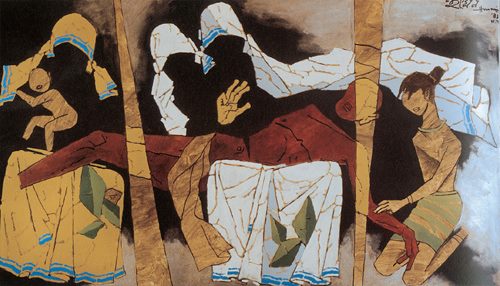Subamma was old, helpless and on the streets. Being paralysed from waist down she lived on just one spot on the earth – in the corner of a busy street in a small town in South India. She seemed to have appeared from nowhere. One morning, office goers found her lying there, wearing a torn saree caked with dirt and her own shit. Someone offered her a few coins, a kind soul brought her some idlis from the nearby eatery. Many tut-tutted about the plight of the elderly who were abandoned by their children. There were others, most others, who crinkled up their noses, and quickly crossed the street before the offensive stench from the dirty old woman assaulted their senses.
A reporter from a local daily saw her and wanted to speak to her. He found that Subamma was not able to tell him much, except her name. Living on the streets had taken its toll. She had lost her mental balance. He tried to give her some food, which she painstakingly tied into the end of her saree. Who knows how long it would be before she would get some more food. She had to save for a rainy day.
The reporter was a cub. He hadn’t been hardened by the ways of the world. He was hurt and confused. He could not get her out of his mind. He shared the story at the office. A small office, in a small town, with a handful of journalists. And now, with a mission. We wanted to get Subamma off the streets.
We called up a home for destitute women. The number was advertised in the telephone directory. We pompously introduced ourselves as journalists. The person on the other end listened to us patiently, asked a few questions and then said: “We are sorry, but we are overburdened. We have no space.” We shrugged and moved to the next number and then the next and then the next: The answer was the same: “We have no space. “
The media, is a handy tool at times. We had a whole newspaper at our disposal. We ran a story about Subamma. Who was she, where was she from, why was she on the streets, and why did a town and its people let a poor, old woman to live in her own shit- without doing anything about it. The story touched the conscience of a few people. They tried to do the same thing that we had done. They called up homes, organisations, NGOs, hostels etc and got the same reply. And they reported back to us.
It appeared as if Subamma was destined to die on the streets. Three days passed… the reporter who found her continued to buy her food. Some of us at the office pitched in. A neighbour had offered an old blanket to keep her warm. But there was no way we could get a roof over her head. And then on the fourth day, a reader called in. She had found the local branch of the Missionaries of Charity and had spoken to the nuns there. She had got the same reply as others about being overloaded with people. “But, you are a newspaper. Why don’t you call?,” she asked.
I picked up the phone and dialled the number. I introduced myself to the nun and spoke to her about Subamma. The nun listened to my story and then politely told me that there were more people in the home than her staff could handle. And she was very sorry. I thanked her for her patience and then asked her: But, sister, while I understand what you are trying to say. Can you please think for a bit what Mother Teresa would have done in your place?
Twenty minutes later, Subamma was taken off the streets. The next day, the office staff decided to pay a visit to the Missionaries of Charity. And there was Subamma, bathed, dressed in a fresh nightdress, sitting on her own bed. Her matted hair had been shampooed and trimmed. She looked up from her hot cup of tea into which she was dipping a biscuit and smiled at the reporter, whom she had come to recognise. She then blew into her tea and proceeded to drink it.
This was 2003. A full six years after the death of Mother Teresa. A mere mention of her name was enough to spur people on to action, to serve, to help, to reach out to the less fortunate. And it still is.
Critics, notwithstanding.
Asma has done her Masters in Journalism and worked with several newspapers in Bangalore and Chennai. She is at present, a full-time mother, a part-time editor of her own newspaper –Positiv+ and a sometime media consultant with several organisations.







That was beautifully written, Asma. Thank you, you just made my day better.
Lovely Asma! It just reaffirms my faith in the human race and that goodness does exist somewhere, every day!! Keep writing.